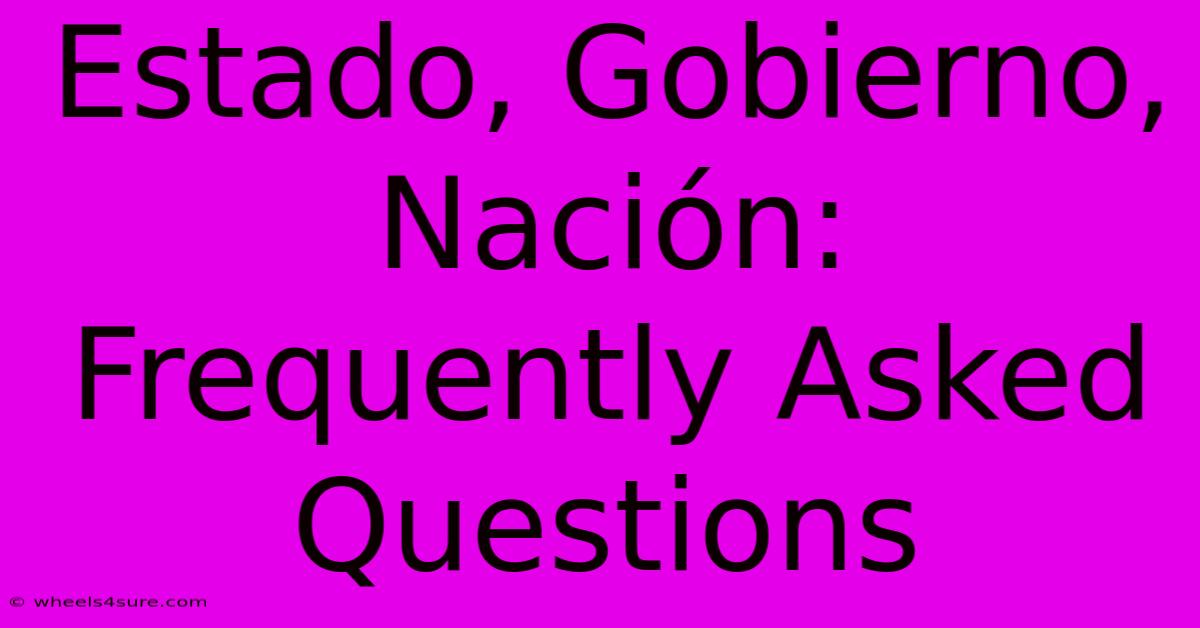Estado, Gobierno, Nación: Frequently Asked Questions

Table of Contents
Estado, Gobierno, Nación: Frequently Asked Questions
Understanding the differences between Estado, Gobierno, and Nación can be tricky, even for native Spanish speakers. These three terms are often used interchangeably, leading to confusion. This FAQ aims to clarify their distinct meanings and relationships.
What is the Estado? (The State)
The Estado, or State, is the most encompassing of the three concepts. It refers to the permanent entity that holds sovereign power over a defined territory and its population. This includes:
- Territory: A geographically defined area under its control.
- Population: The people residing within its territory, subject to its laws.
- Sovereignty: The supreme authority within its borders, free from external control.
- Government: While distinct, the government is part of the State, carrying out its functions.
- Institutions: The Estado comprises various institutions like the judiciary, legislature, and executive branches, along with other public bodies.
Think of the Estado as the whole entity, a complex structure with multiple components working together.
What is the Gobierno? (The Government)
The Gobierno, or Government, is the group of people who exercise the political power of the Estado. It's the executive branch, responsible for implementing laws and managing the affairs of the State. The specific composition and structure of the government vary depending on the political system (e.g., presidential, parliamentary). Key features include:
- Executive Power: Enforces laws, manages budgets, and oversees public administration.
- Limited Term: Governments typically have a defined lifespan, determined by elections or constitutional mandates.
- Accountability: The government is accountable to the people (through elections) and/or to the legislature.
The Gobierno is a temporary component of the Estado. It can change through elections or other constitutional processes, while the Estado remains.
What is the Nación? (The Nation)
The Nación, or Nation, refers to a group of people who share a common identity, usually based on factors like:
- Culture: Shared language, traditions, customs, and values.
- History: A common historical experience and narrative.
- Territory: While not always strictly defined, nations often associate with a specific territory.
- Self-determination: A desire to govern themselves, often expressed through nationalism.
A Nación can exist independently of a state (e.g., a stateless nation) or it can be the basis for the formation of a state (e.g., a nation-state where the nation and state largely coincide). It's crucial to remember that a Nación is defined by its people's shared identity, not necessarily by its political organization.
What's the Relationship Between Estado, Gobierno, and Nación?
The relationship is complex and can vary across countries. Ideally, a nation-state exists where the Nación (the people) forms the basis of the Estado (the state), and the Gobierno (the government) acts as its representative, governing according to the will of the people. However, this ideal is often not fully realized. There can be significant tensions between these three elements, particularly when the government doesn't represent the interests of the nation or when the state encompasses multiple nations.
Frequently Asked Questions (FAQs):
- Q: Can a state exist without a nation? A: Yes, a state can exist without a cohesive nation, often encompassing diverse groups with different identities.
- Q: Can a nation exist without a state? A: Yes, many stateless nations exist, striving for self-determination.
- Q: What happens when the government changes? A: The Gobierno changes, but the Estado remains, continuing its existence.
- Q: Is the Estado always legitimate? A: Not necessarily. A state might lack legitimacy if it does not represent the will of its people or violates fundamental human rights.
Understanding the distinctions between Estado, Gobierno, and Nación provides a crucial framework for comprehending political systems and the dynamics of power and identity. These concepts are intertwined but distinct, highlighting the complexity of political organization and societal structures.

Thank you for visiting our website wich cover about Estado, Gobierno, Nación: Frequently Asked Questions. We hope the information provided has been useful to you. Feel free to contact us if you have any questions or need further assistance. See you next time and dont miss to bookmark.
Featured Posts
-
Tinubus 2024 Net Worth Forbes Official Figures
Mar 28, 2025
-
Anne Boleyns Son A Royal Conspiracy
Mar 28, 2025
-
Mom Salary Comparison Finding The Best Benefits
Mar 28, 2025
-
The Legacy Continues John Mellencamps Daughters Impact
Mar 28, 2025
-
The Secret Life Of Bernice Burgos Daughter
Mar 28, 2025
